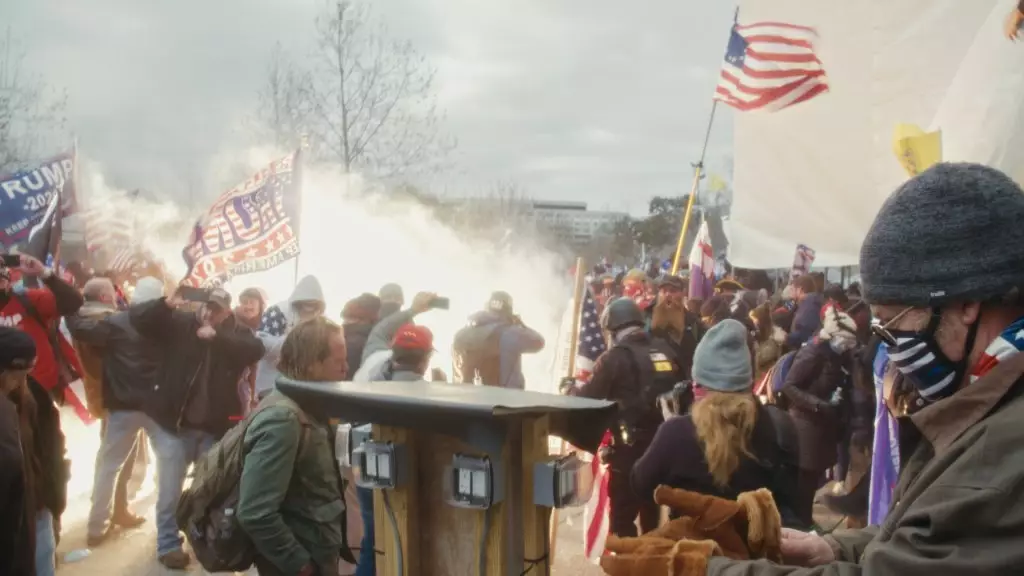The January 6, 2021, riot at the United States Capitol marked a tumultuous chapter in American history, igniting debates about democracy, political extremism, and social division. As the nation grapples with the aftermath, a new documentary titled “Fight Like Hell,” directed by Jon Long, approaches this polarizing event with fresh eyes. Premiering on YouTube on September 24, the film promises an introspective exploration, utilizing high-quality footage that captures the chaos yet refrains from tethering itself strictly to partisan viewpoints.
What sets “Fight Like Hell” apart from other media portrayals is its commitment to documenting not merely the riot itself but the intricate narrative that culminated in that day of violence. By diving into the “Stop the Steal” movement’s evolution from its inception, the film unravels the rhetoric and actions that fueled the Capitol incursion. This retrospective offers audiences a room to reflect upon democracy’s fragility—a theme that resonates deeply amidst growing polarization.
The documentary does not shy away from involving controversial figures directly tied to the events leading up to January 6. With personalities like Roger Stone, Steve Bannon, Rudy Giuliani, and Michael Flynn taking center stage, “Fight Like Hell” provides a comprehensive look at those whose actions have become synonymous with the rhetoric surrounding the Capitol riot. Each figure embodies a facet of a complex socio-political landscape, elucidating how intertwined narratives can spark actions that threaten democratic values.
For instance, Roger Stone, recognized as the architect behind the “Stop the Steal” campaign, represents a strategic transition from political maneuvering to overt action. At the same time, Steve Bannon’s strategies reflect an aggressive approach to politically mobilizing individuals, which catalyzed extreme viewpoints among segments of the population.
Interestingly, the documentary positions these figures not solely as villains but as part of a broader cultural phenomenon, examining how their rhetoric resonated with a disillusioned base. The film serves as a reminder that understanding their motivations is crucial in addressing the underlying issues of contemporary democracy.
In an era defined by “fake news” and deeply entrenched media echo chambers, Long advocates for an apolitical, grounded approach to storytelling. He emphasizes that the documentary aims to cut through the noise of misinformation to reveal unvarnished truths about what transpired on that fateful day. The choice to present events without partisan narrative reflects an ambition to offer an authentic and illuminating examination of societal fractures.
Long’s statement captures a pivotal concern: many individuals remain ensconced within their political factions, thus hindering a collective understanding of the events leading to January 6. By framing the film as an independent narrative, it lays down a challenge to viewers, encouraging them to step outside their comfort zones and engage with uncomfortable realities.
“Fight Like Hell” also serves as an urgent call to action for audiences. By confronting the harsh realities surrounding the Capitol riot, the documentary invites viewers to consider their roles in the safeguarding of democracy. As Long articulates, the overarching message resonates with a sense of collective responsibility, pushing viewers to evaluate how inaction and tacit acceptance may facilitate the erosion of democratic norms.
Ultimately, the title of the film is drawn from President Trump’s own words on January 6, encapsulating the urgent sentiments of a frustrated populace. However, this dynamic evokes contemplation; the call to “fight” can be interpreted in vastly different contexts, and the film’s exploration intends to unveil the nuances within that single moment.
As much as “Fight Like Hell” emerges from the chaos of the Capitol riot, it is not merely a recounting but rather a poignant meditation on the intersections of politics, society, and personal responsibility. Its independent stance, reliance on first-hand footage, and unpacking of complex figures within the narrative exemplify a significant attempt to engage viewers with the substantive intricacies of contemporary political disputes. In a world where understanding seems more crucial than ever, this documentary stands as a compelling reminder of the collective duty to uphold democratic ideals, even amidst daunting challenges.

Leave a Reply